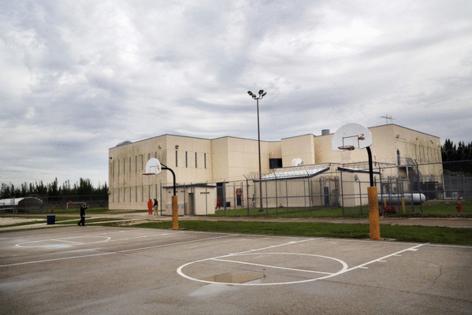ICE has built a plexiglass tent city at Florida's Krome detention center to house hundreds of immigrants
Published in News & Features
MIAMI — As the Trump administration ramps up its mass deportation efforts, immigration authorities have erected a plexiglass tent at the Krome Detention Center in South Florida, a facility that has recently been so overcrowded that detainees have been sleeping on the floor.
After a tour of Krome on Thursday, U.S. Rep. Frederica Wilson said that a two-story plexiglass tent had been recently constructed and could house detainees as soon as Friday. She said the structure was built in just 14 days and estimated it could hold as many as 400 detainees, though the Miami Herald could not independently confirm its official capacity. The tent includes features such as a small TV room and visible air conditioning pipes.
“They did admit that they are building a tent city. You can see it. It’s very clear,” Wilson said. “This is a huge structure.”
Wilson described the tent facility to the Herald as white on the outside, with 200 cots lined up side by side on the first floor and another 200 on the second level. Inside, there’s a small area designated as a TV room—so small, she noted, it couldn’t possibly accommodate all 400 detainees. The tent also includes temporary bathrooms and showers, and is illuminated by bright tube lighting that stays on throughout the night.
“They’re anticipating more people coming in,” she noted, adding that the facility is preparing to expand further, with plans to build additional tents to accommodate the growing number of detainees.
An Immigration and Customs Enforcement spokesperson said he was working on a response to the Herald’s inquiries about the temporary facility’s capacities and resources.
Former detainees, their families and their lawyers have told the Herald in recent weeks that Krome has become overcrowded and unhygienic, with little to no access to medical or mental health care — despite ICE policies that are supposed to uphold stringent standards of treatment in detention facilities. They described a facility stretched to its limits, with detainees living in a state of desperation.
Wilson said she couldn’t witness the inhumane conditions that attorneys, family members and detainees described to the Herald, because “they took us on a field trip.” She pointed out that facility officers ”don’t want you to see that,” and added she plans to return to the facility unannounced. She said the facility was looking freshly spruced up, as if it had been given “a whole new coat of paint” just before her visit.
“You can even smell the paint. That’s what they do,” she said. But she emphasized that the reality is likely closer to what detainees are telling their families and attorneys. “We cannot lose sight of that. And that’s why it’s important for us to show up—to let them know we’re coming to provide oversight.”
Her visit to Krome came three weeks after she said she had “urgently requested” an official visit through a letter to Secretary of Homeland Security Kristi Noem in order to assess the detainees’ living conditions. The request followed the Herald investigation that highlighted critical issues regarding the treatment and condition of detainees.
At the time, Wilson stated in the letter that, although she fully supports lawful detention and the enforcement of the law, “this is balanced by the need to ensure that people who are in government custody are not treated inhumanely, no matter the circumstance.”
Since President Donald Trump took office, Homeland Security has stepped up immigration arrests nationwide as part of his mass deportation initiative. In Trump’s first 50 days, more than r 32,800 people were detained, according to ICE data. Public records show roughly 600 detainees being housed at Krome — one of four ICE detention centers in Florida — but detainees and their attorneys say the real number is likely much higher, far surpassing the facility’s capacity.
Wilson criticized Homeland Security for shutting down three immigration watchdog offices responsible for protecting civil rights and addressing both individual and systemic issues within the detention system. “Those offices were essential for ensuring accountability and humane treatment,” she said.
Wilson says the country is facing an emergency: “We’re gonna need those watchdogs offices because people are being picked up taken to these detention centers, and they don’t know their rights.”
After speaking with several detainees of various nationalities, Wilson added, “they shouldn’t be there to begin with. Most of the men I spoke with are not criminals. They’re working people—paying taxes, raising their children and families. To be snatched away from all of that—it’s just not right.
“It’s only going to get worse. Every time this facility gets crowded, in order to stay in compliance, they have to build another tent to stay in compliance—and it only takes 14 days. I was stunned.” Wilson said. “They told us that as new detainees come in, they try to transfer people out, but they just can’t keep up.”
©2025 Miami Herald. Visit at miamiherald.com. Distributed by Tribune Content Agency, LLC.







Comments